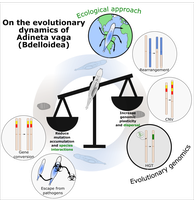Thesis defence by Nicolas Debortoli
- https://ilee.unamur.be/events/thesis-defence-by-nicolas-debortoli
- Thesis defence by Nicolas Debortoli
- 2018-05-04T15:30:00+02:00
- 2018-05-04T17:30:00+02:00
- Evolutionary and ecological dynamics of bdelloid rotifers - an “evolutionary scandal”!
- When May 04, 2018 from 03:30 PM to 05:30 PM (Europe/Brussels / UTC200)
- Where Auditorium M01
- Contact Name
-
Add event to calendar
 iCal
iCal
 Bdelloid rotifers are notorious for their long-term evolution in the absence of meiosis, which led John Maynard Smith to dub them “evolutionary scandals” as it seemed to contravene the general prevalence of sexual reproduction in the animal kingdom. Although bdelloids do not exchange genes via conventional sex, evidence is mounting for their ongoing accumulation of non-metazoan genes through horizontal gene transfers. These transfers have been linked to the capacity of bdelloid rotifers to withstand desiccation at any stage in their life cycle, which creates multiple DNA double-strand breaks that are repaired upon rehydration. Furthermore, desiccated individuals group together and are easily dispersed by wind over long geographical ranges.
Bdelloid rotifers are notorious for their long-term evolution in the absence of meiosis, which led John Maynard Smith to dub them “evolutionary scandals” as it seemed to contravene the general prevalence of sexual reproduction in the animal kingdom. Although bdelloids do not exchange genes via conventional sex, evidence is mounting for their ongoing accumulation of non-metazoan genes through horizontal gene transfers. These transfers have been linked to the capacity of bdelloid rotifers to withstand desiccation at any stage in their life cycle, which creates multiple DNA double-strand breaks that are repaired upon rehydration. Furthermore, desiccated individuals group together and are easily dispersed by wind over long geographical ranges.
To understand the consequences of asexuality and desiccation on the evolution of bdelloid rotifers, my PhD thesis addressed several questions investigating the evolutionary and ecological dynamics of the widespread bdelloid lineage Adineta vaga. By designing new genetic markers I detected, for the first time, apparent genetic exchanges among Adineta individuals sampled in the wild. Moreover, I detected incongruence in species boundaries inferred from distinct genetic markers, suggesting the occurrence of DNA transfers between species. I further revealed intermixed signatures of DNA transfers, gene conversion and asexual evolution, highlighting the highly dynamic nature of the genome of bdelloid rotifers. Furthermore, the impact of various ecological parameters (dispersal, reproduction, survival, species interactions and environmental conditions) on the community structure of Adineta lineages was studied.
 Overall, my results suggest that despite their asexuality, the evolution of bdelloid rotifers encompasses apparent genome diversification through chromosomal re-arrangements and DNA transfers; genome homogenization through gene conversion; community diversification through passive dispersal and habitat specialization. Desiccation may play an important role in all these processes, reinforcing its potential impact on the evolution of bdelloid rotifers.
Overall, my results suggest that despite their asexuality, the evolution of bdelloid rotifers encompasses apparent genome diversification through chromosomal re-arrangements and DNA transfers; genome homogenization through gene conversion; community diversification through passive dispersal and habitat specialization. Desiccation may play an important role in all these processes, reinforcing its potential impact on the evolution of bdelloid rotifers.
Nicolas will present the results of his PhD thesis he conducted in the Research Unit of Environmental and Evolutionary Biology (URBE) under the supervision of Karine Van Doninck.
 Institute of Life, Earth and Environment
Institute of Life, Earth and Environment
